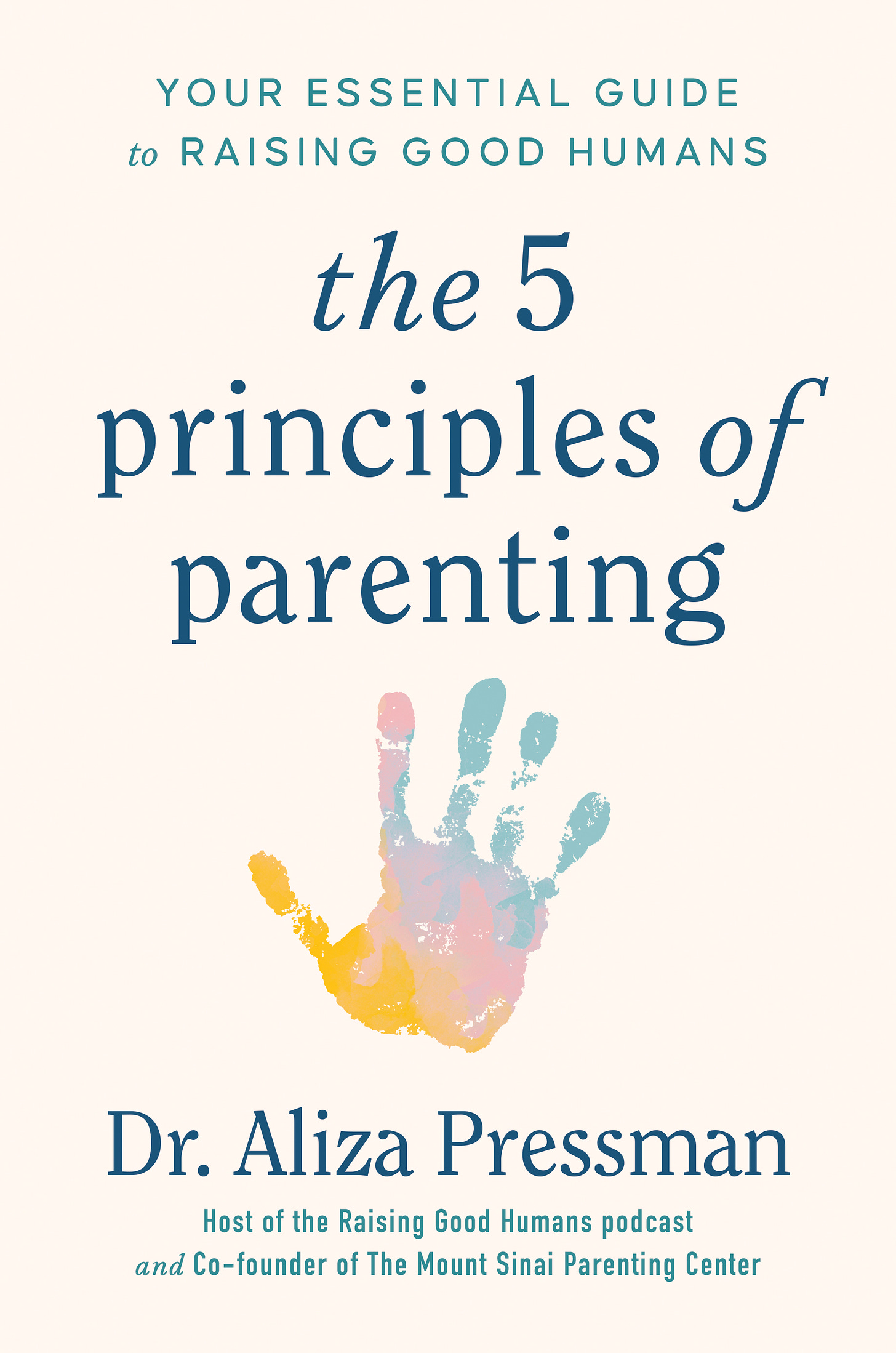Thanks for reading Raising Good Humans on Substack! My first book, The Five Principles of Parenting: Your Essential Guide to Raising Good Humans is now available for purchase here.

It is reasonable to want our kids to grow into motivated, independent, and fulfilled adults. But how do we foster that internal drive, that spark of curiosity and passion, without resorting to ineffective and potentially problematic control and pressure? In this week’s episode of the Raising Good Humans Podcast, I interview author and clinical neuropsychologist, Dr. William Stixrud, co-author of The Seven Principles for Raising a Self-Driven Child: A Workbook to explore this very question!
Here are 5 Key Takeaways on How to Raise a Self-Driven Kid:
1. Trust More, Worry Less
A significant barrier to raising self-driven children is our own anxiety. It’s natural to worry about your child’s future, but excessive worry can lead to micromanagement and a lack of trust - even when we mean well, and especially when we worry that our child needs more from us. But without the chance to do more on their own, and fail repeatedly, it’s impossible for our children to practice the skills we know they need. Trusting more means allowing our kids to make mistakes and learn from the consequences. While this is HARD, it means trusting the learning process, too.
“Giving kids more control over their lives means that you are controlling less. And the most stressful thing we can experience as parents is a low sense of control.” Dr. William Stixrud
By stepping back and allowing your child to navigate challenges, you are teaching them resilience and self-reliance. Afterall, our ultimate goal should be for our child to be able to run their own life before they leave home. To grow, fail, and learn in the safety of your environment. This requires giving them the space to practice making decisions, even if those decisions aren’t always perfect, and then trusting in their ability to figure things out.
2. Shift from Manager to Consultant
Even though we are letting go, it doesn’t mean we are not offering kids help when they need it. But trying to control every aspect of a child’s life can actually stifle their motivation. So, instead of dictating every move, we can offer support, guidance, and advice when needed, while ultimately allowing our children to make their own decisions. We can always listen, validate, and offer support when needed, but we don’t need to take over.
This is especially important for children with executive function challenges. Rather than forcing help, and creating constant tension and argument, we can offer scaffolding and coaching, letting our child take the lead. By offering help without forcing it, you empower your child to take ownership of their life and develop their own problem-solving skills. This approach builds confidence and fosters a sense of responsibility, which are crucial for self-drive. Plus, it offers a relief to you from the stress of doing everything for everyone.
“As kids get older, we want parents to think about themselves as consultants to their kids. The mission is not to make sure that they turn out a certain way, or that they always do well. This mission is to help them figure out who they want to be, what kind of life they want, and how to create that life before they leave home.” Dr. William Stixrud
3. Cultivate Passionate Pursuits
True self-drive often stems from engaging in activities that a child genuinely enjoys. As we discuss, the research on “passionate pursuit of pastimes,” emphasizes that motivation is often sparked by engaging in activities that children care about, whether it’s sports, music, art, or even building with Legos. When children are engaged in these activities, they experience a state of flow, combining high energy and attention with low stress. This not only sculpts the brain in positive ways but also fosters a sense of self-drive that can transfer to other areas of life, including academics.
But what if you don’t support your child’s pursuits? Yup, I’m talking about things like, for example, video games. If your child seems primarily interested in video games, remember that there is lots of skill-building they can get from the games, so start with connection - playing alongside them, learning from them, understanding their interest - and then engage in collaborative problem-solving around their usage. Express your concerns about balance, and negotiate limits that make sense to both of you and are within the healthy range of screen use.
“Kids don't have to be intrinsically motivated for everything, but having some things in their life that they are intrinsically motivated for is incredibly beneficial.” Dr. William Stixrud
4. Communicate Healthy Expectations
How you communicate your expectations can significantly impact your child’s self-drive. Dr. Stixrud emphasizes that the most powerful expectations are communicated through confidence and belief in a child’s abilities, rather than through pressure and coercion.
Coercive expectations can undermine a child’s sense of control and contribute to perfectionism. Plus, they create an environment of battle, of constant argument and stress, and take away from moments where your child can see you delighting in them. To start, ask your children about their perception of pressure from you. Often, they feel more pressure from themselves not to disappoint you than from any explicit pressure you are putting on them. This means that open communication and reassurance can help alleviate this and create a more supportive environment. Let them know that your love and acceptance are unconditional, regardless of their achievements.
“The most powerful expectations are communicated through a kind of soft communication that says, ‘I have confidence you can do this, I believe in you,’ as opposed to ‘Get those grades up. You need to do this.’” Dr. William Stixrud
5. Worry Less, Monitor Less, Manage Less…And Focus on Relationships
So, how do we let go? As Dr. Stixrud explains, most of our worry is about the future. If we could remember that our children will eventually be fine, will have ups and downs, failures and successes, and will end up OK, we could realize that the worry doesn’t suit us (or them). Let this go, focus on your relationship and the present, and have confidence. Our relationship with our child is the single most protective factor we can offer. And it really matters. Talk to your child about how much you love them, and strive to be a non-anxious presence. Calm is contagious, and when you are able to manage your own anxiety, you create a safer and more supportive environment for your child. As I have said before, it is heartening to know that your relationship IS what you can control, and is the most important.
“We want to continually love our children as they are, and enjoy them as much as we can, so that they experience themselves as joy producing organisms, as opposed to frustration or anxiety or anger producing organisms.” Dr. William Stixrud
Finally, cutting the behaviors that feed your anxiety is an essential part of promoting your relationship. Trust goes both ways, as does respect. Avoid constantly checking grades or tracking their every move. You don’t need this to feel like a good parent, and you can use this as the excuse to ‘let it go’! Try admitting to your child that you cannot always protect or keep them safe, but that they have the skills and ability needed to play a role in that. Empower them to learn the skills if they don’t have them, and talk about how they will use these in the future to care for themselves (nothing magical happens development-wise in college, so if we don’t practice these skills before then, our kids won’t have them!) By reducing your monitoring and managing, you give your child the space to develop their own sense of responsibility and self-reliance. And it’s a gift they need most of all.
A quick reminder to buy my first book, The Five Principles of Parenting, and write a review from wherever you order. Reviews really help to get the book noticed, and to spread the word. Please especially rate and review any books purchased on Amazon (it shockingly really, really matters!). Also, when you receive the book, snap a quick pic with it and post on social media. Share one thing you love about it and help me to get more copies into the hands of parents in your community. Tell a friend about the book, or about something you found helpful in the book. Parents look to each other for advice, and I’d love to be a part of the support you pass on to your loved ones.






Such good stuff! Thanks for sharing, Aliza!